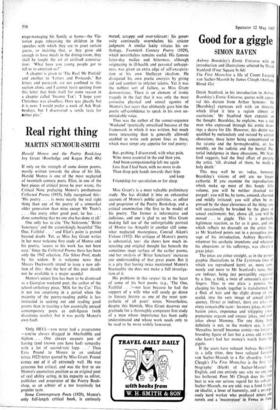Real right thing
MARTIN SEYMOUR-SMITH
Harold Monro and the Poetry Bookshop Joy Grant (Routledge and Kegan Paul 40s)
If only on the strength of some dozen poems, mostly written towards the close of his life, Harold Monro is one of the most neglected of twentieth century poets. Eliot, in one of the best pieces of critical prose he ever wrote, the Critical Note prefacing Monro's posthumous Collected Poems (1933), fully recognised this: 'His poetry . . . is more nearly the real right thing than any of the poetry of a somewhat older generation than mine except Mr Yeats's . . . like every other good poet, he has . . . done something that no one else has done at all.'
One only has to cite 'The Sickroom,' Bitter Sanctuary' and the astonishingly beautiful 'The One, Faithful . . .' and Eliot's point is proved beyond doubt. Yet, as Miss Joy Grant writes in her most welcome first study of Monro and his poetry, 'access to his work has not been easy.' Since the Collected Poems there has been only the 1942 selection, The Silent Pool, made by his widow. It is welcome news that Messrs Duckworth intend to issue a new edi- tion of this : that the best of this poet should not be available is a major scandal.
Monro's unjust fate has been to be dismissed as a Georgian weekend poet, the author of the school-anthology piece, 'Milk for the Cat.' This is not too surprising in a period when the majority of the poetry-reading public is less interested in seeking out and reading good poems than in treating a few essentially unread contemporary poets as cult-figures (with disastrous results); but it was partly Monro's own fault.
'Only HELL—you never had a programme —you've always dragged in Aberbubble and Siphon. . . . One always suspects you of having (and known you have had) sympathy with a lot of second-rate lopp. . . .' Thus Ezra Pound to Monro in an undated (circa 1922) letter quoted by Miss Grant. Pound comes out of it all extremely well. He was generous but critical, and was the first to see Monro's anomalous position as an original poet of real ability acting, in his capacity as editor, publisher and proprietor of the Poetry Book- shop, as an arbiter of a too hopelessly lax popular taste.
Some Contemporary Poets (1920), Monro's only full-length critical book, is curiously muted, scrappy and over-tolerant: his genet.= osity continually overwhelms his stricter judgment. A similar laxity vitiates his an- thology, Twentieth Century Poetry (1929), which nevertheless remains useful. His famous latter-day malice and bitterness, although originating in ill-health and personal unhappi- ness, was given an extra edge of self-exaspera- tion at his own Shelleyan idealism. He dissipated his own poetic energies by giving aid and comfort to inferior talents. Yet it was the noblest sort of failure, as Miss Grant demonstrates. There is an element of ironic tragedy in the fact that it was only the most corrosive physical and sexual agonies of Monro's last years that ultimately gave him the poetic self-confidence to speak in his own un- mistakable voice.
Thus was the author of the sonnet-sequence 'Weekend' (poetically unrealised because of the framework in which it was written, but much more interesting than is generally allowed) enabled to write such potent lines as these, which must tempt any appetite for real poetry: But, probing, I discovered, with what pain, Wine more essential in the end than you, And boon-companionship left me again Less than I had been, with no more to do Than drop pale hands towards their hips and keep Friendship for speculation or for sleep.
, -
Miss Grant's is a most valuable preliminary study. She has divided it into an exhaustive account of Monro's public activities, as editor and proprietor of the Poetry Bookshop, and a critical examination (the first to be made) of his poetry. The former is informative and judicious, and one is glad to see Miss Grant making full use of the unforgettable portrait of Monro (as Arnault) in another still some- what neglected masterpiece, Conrad Aiken's Ushant (1952). Her critique of Munro's poetry is substantial, too: she shows how much in- teresting and original thought lies beneath the sometimes inept surface of the earlier poems, and her analysis of 'Bitter Sanctuary' increases our understanding of that great poem. But it is a pity that having twice mentioned Monro's bisexuality she does not make a full investiga- tion of it.
His problems in this respect lie at the heart of some of his best poems (e.g., 'The One, Faithful . . .'—not least because he had the support of a wife who will surely go down to literary history as one of the most sym- pathetic of all poets' wives. Nevertheless, despite this blemish, Miss Grant deserves our gratitude for a thoroughly competent first study of a man whose importance has been sadly understimated and whose work needs only to be read to be more widely honoured.






























 Previous page
Previous page